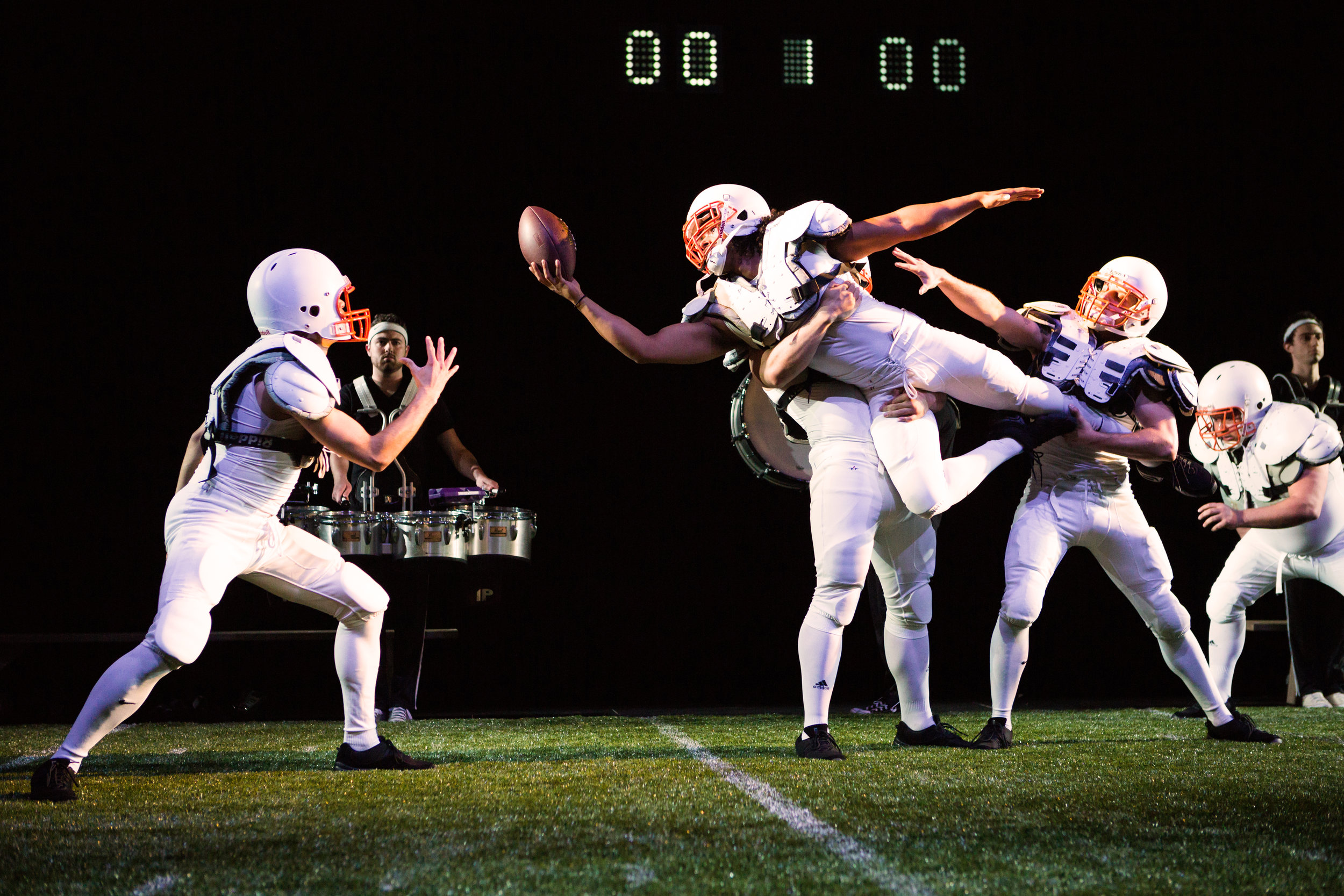
Andrew Hinderaker’s play, Colossal has been making waves in theatres from D.C., to Texas, to Maryland, to Minnesota, and beyond.
Colossal is described as “an epic event that simultaneously celebrates and attacks our nation’s most popular form of theatre: football. A star football player – a pro prospect, one of the most graceful runners in the world, and a man in love with a teammate – struggles to move forward in the wake of a catastrophic spinal cord injury. With full-contact choreography, this play about love, ability, and extraordinary feats of strength tackles definitions of masculinity and the male body as vehicles for language, violence, and silent expression through dance, football, and disability.”
Today we discuss the harrowing play with Andrew (A), the playwright, and Mike Thornton (M), the actor who originated the leading role.
Andrew, how did you come to write Colossal, and Mike, how did you become involved with the play?
A: I was in grad school at the University of Texas in Austin, and a mentor of mine, Kirk Lynn, said we have all these University resources, what is the play you want to write where you can dream impossibly big? He said, “Write your unreproducible play.” And I did have this idea for a piece about a football player who is struggling to move forward in the wake of a catastrophic spinal injury, and I sort of felt in my bones that it was going to be a pretty massive piece of theatre. Kirk’s challenge really gave me the freedom to write the piece I wanted to write.
Another major influence came from my collaboration with the actor Mike Thornton, who was disabled through a spinal injury himself. I approached Mike cautiously – I knew I ran the risk of sounding like I was coming to him because it’s a disability story – and I really wanted to communicate that I was coming to him because I thought it was a story of heartbreak and how one moves forward in the wake of loss.
M: I remember a very early conversation going through the basics of what spinal cord injuries are. I put Andrew in contact with a couple physical therapists and real medical superstars in the area of spinal cord injuries/rehabilitation from the Shirley Ryan AbilityLab who see everything from sports injuries to the most anomalous, weird, random things. And once the science was scratched away, we got into the deeper wounds, and the personal feelings that accompany such a loss.
It always seemed fitting that the word ‘loss’ sits right in the middle of the title, Co-LOSS-al. We had some very real conversations of what I lost personally. And not just my physical capacity, but the loss of friendships, the loss of a girlfriend who was very serious and dear to me too. From there, Andrew worked his magic.
Can you talk about the world premiere of Colossal?
A: The first production was at the University of Texas in a beautiful 1920’s gym that was converted in to a dance studio. We had a $700 budget, but we also had support from the dance department and the UT football team. So many students were coming to see the play we had to seat people on gym mats.
Have other actors with different ranges of ability played the role as well? And how has that impacted the show?
A: We tested out some things when we produced the play in Minneapolis and Dallas with other actors in the role. What we ultimately realized was that the character of Mike should have an incomplete spinal injury. There’s a story point of Mike completing a sit-to-stand exercise in his physical therapy. When we did it with Mike Thornton originally, he completed the sit-to-stand, and that was a stunning final moment for the play. But that was not part of the physical vocabulary of the next couple of actors who played Mike. They were not able to complete a sit-to-stand, which informed the story in a very beautiful way. Instead of delivering this final image where Mike is standing, the final moment became about this father and son navigating a new normal, finding a way to talk to each other, and having Mike move forward and step into the present tense of his life.
So I encourage future productions to know that. Yes, it is a story point that he has an incomplete spinal injury; yes, it is a story point that sit-to-stands are part of his rehabilitation. But at its core it is a story about a character who is discovering a new physical language, a new normal. That aspect will always be the most profound if other productions incorporate the physical vocabulary of their actors into that.
The play uses a powerful device by having two actors play the role of Mike. There is Young Mike who exists prior to his spinal injury, and Mike who is now disabled and is looking back on his former self. It is crucial to this play that one actor does not perform the character of Mike, but two, who have very different capacities for movement. Can you speak to this dramatic choice?
M: I think loving your former self is a vital and painful cocktail for someone who has become disabled. When I was doing the play, I would watch my “former self” onstage played by Young Mike. This younger character has so much bravado and vulnerability, which ends up costing him almost everything, physically. Sometimes I felt like hating my former self, but at the end of the day, it’s about forgiving your former self. Forgiving yourself for being who you were. I think if you’re playing that role and it’s about football, you’re really off.
A: I think that the theatre provides the possibility to go anywhere, right? To me, is it feels like the idea of Mike and Young Mike is less a theatrical device and more a realization of the rawest, truest, emotional reality, which is that the past is alive and vibrant and fighting to take over the present. We were trying to embody the conflict of that experience, rather than talk about it.
M: This is what great playwrights do, they create their own dramaturgy. They play is so panoptic because it’s located in that nexus of love and loss. There’s this prevalent idea that post-traumatic stress disorder is a disease of time. I think Colossal illustrates time in an exciting and painful way: there’s the scoreboard, the play is divided into quarters, and the clock is always running down. And suddenly, we’re juxtaposing time against a temporal experience of memory. That’s why you don’t fast forward through those smaller scenes between the coach and Mike, because when something so colossal happens, everyone becomes disabled by it.
To purchase a copy of Colossal click here, and to learn more about licensing a production, click here.

Newly Available for Licensing – January 2026 (US)

Comedy Mysteries: Gasps, Laughs and Thrills

